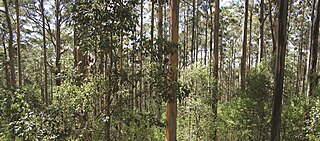Related Research Articles
Public holidays in Australia refer to the holidays recognised in law in Australia. Although they are declared on a state and territory basis, they comprise a mixture of nationally celebrated days and holidays exclusive to the individual jurisdictions.

The Australian Government, also known as the Commonwealth Government or His Majesty's Australian Government, is the national government of Australia, a federal parliamentary constitutional monarchy. Like other Westminster-style systems of government, the Australian Government is made up of three branches: the executive, the legislative, and the judicial.
The Australian Trade and Investment Commission, or Austrade, is the Australian Government's trade, investment and education promotion agency which was also given responsibility for tourism policy, programs and research from 2013. Austrade was established under the Australian Trade Commission Act 1985. It is a non-corporate Commonwealth entity under the Public Governance, Performance and Accountability Act 2013, and a statutory agency under the Public Service Act 1999. Austrade is part of the Foreign Affairs and Trade portfolio.

The criminal law of Australia is the body of law in Australia that relates to crime.

Wine Australia is an Australian Government statutory corporation that promotes and regulates the Australian wine industry. It was created as the Australian Wine and Brandy Corporation (AWBC) in 1981 to replace the Australian Wine Board by the Australian Wine and Brandy Corporation Act 1980, and had its name changed by the amended Wine Corporation Act 1980, passed in December 2010. Wine Australia is now governed by the superseding law, Wine Australia Act 2013. Wine Australia determines the boundaries of Australia's wine regions and sometimes names them. Wine Australia also regulates wine exports, ensuring the quality and integrity of each shipment of wine exported. Wine Australia has three main departments; Compliance, Market Development and Knowledge Development.
The machinery of government is the interconnected structures and processes of government, such as the functions and accountability of departments in the executive branch of government. The term is used particularly in the context of changes to established systems of public administration where different elements of machinery are created.

The Forest Products Commission (FPC) is a Western Australian Government trading enterprise established under an Act of Parliament, responsible for the development and marketing of the state's renewable timber resources. The agency was established as part of the then-Court Government's response to the debate regarding logging in old-growth forests. The minister responsible for the agency is the Minister for Forestry, currently Jackie Jarvis of the Labor Party.

The Constitution of Australia is a constitutional document that is supreme law in Australia. It establishes Australia as a federation under a constitutional monarchy and outlines the structure and powers of the Australian government's three constituent parts, the executive, legislature, and judiciary.
The Western Australian Land Information System (WALIS) was established by the Western Australian (WA) Government in 1981. It is responsible for co-ordinating the discovery of, and access to, location-based or geographic data generated by WA Government agencies. WALIS achieves this through partnerships between organisations, projects, committees and working groups; coordinated through the WALIS Office at Landgate.

The Transport Integration Act 2010 is a law enacted by the Parliament of the State of Victoria, Australia. The Act is the prime transport statute in Victoria, having replaced major parts of the Transport Act 1983, which was renamed as the Transport Act 1983.

Australia is one of many countries that have water fluoridation programs currently operating. As of March 2012, artificially fluoridated drinking water is administered to 70% or more of the population in all states and territories. The acceptance of the benefits of water fluoridation occurred in Australia in December 1953, roughly two years after acceptance in the United States. Many of Australia's drinking water supplies subsequently began fluoridation in the 1960s and 1970s. By 1984 almost 66% of the Australian population had fluoridated drinking water, represented by 850 towns and cities. Some areas within Australia have natural fluoride levels in the groundwater, which was estimated in 1991 to provide drinking water to approximately 0.9% of the population.

Jacklyn Anne Trad is a former Australian politician. She was Deputy Premier of Queensland from 2015 to 2020, Treasurer of Queensland from 2017 to 2020 and represented the Electoral district of South Brisbane for the Labor Party from April 2012 to October 2020.
The Florida SBDC Network provides tools, training and resources to small businesses, and has more than 40 offices.
The Department of Planning, Lands and Heritage is the department of the Government of Western Australia responsible for planning and managing all land use and heritage considerations within the state. The Department was formed on 28 April 2017 as a merger of the former departments of Planning, Lands Management, the Heritage Council and the heritage and land management functions of the former Department of Aboriginal Affairs.
The Aboriginal Heritage Act 1972 (AHA) is a law in the state of Western Australia governing the protection of Aboriginal cultural sites, which is as of 2022 being superseded by the Aboriginal Cultural Heritage Act 2021.
The 2025 Western Australian state election is scheduled to be held on 8 March 2025 to elect members to the Parliament of Western Australia, where all 59 seats in the Legislative Assembly and all 37 seats in the Legislative Council will be up for election.
Jackie Jarvis is an Australian politician.
The Department of the Premier and Cabinet is a department of the Government of Western Australia. The department was formed in 2001 under the Public Sector Management Act 1994.
References
- ↑ The West Australian, 2014.
- ↑ "WALW - Small Business Development Corporation Act 1983 - Home Page". www.legislation.wa.gov.au. Retrieved 18 June 2021.
- 1 2 "Homepage". Small Business Development Corporation. 30 November 2021. Retrieved 4 December 2021.
- SBDC 30th anniversary. The West Australian (Perth, WA), 7 May 2014, Business News, p. 4